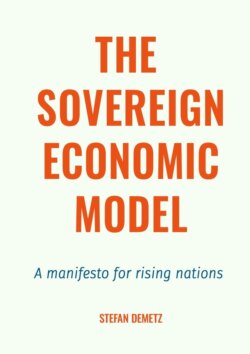Читать книгу The Sovereign Economic Model. A manifesto for rising nations - Stefan Demetz - Страница 17
Economics of the sovereign economic model
Business Environment in a Sovereign Economic Model
Оглавление«What’s in for me?» is the question most ask. For every rule and regulation, people and business evaluate the changed status quo and ask this question. While the government tries to use carrot and stick and to balance pros and cons with the interests of various stakeholders, the fact of life is that some will win and some will lose.
In state capitalism, the government takes ownership or majority control of companies in strategic sectors of the economy. This creates a big headache for private companies in that sector, who are asking what’s in it for them. If the state-owned enterprises are non-aggressive and compete fairly, not using specially biased laws in their favor, competition is normal, as with other private companies. They may sometimes even collaborate to create common tech or cooperate with foreign operations. In fair conditions, the government is interested in a tide that lifts all boats. This is the case in Russia, with Novatek as the largest LNG exporter and Lukoil as the second-largest oil company; both companies happily coexist with state giants Gazprom and RosNeft. On the contrary, if the government behaves aggressively and moves into some sectors, companies and their owners must drastically adapt. Some might even have to sell a majority stake or the entire company at a fair market price because they cannot resist the onslaught from the government.
In the Sovereign Economic Model, the economic KPI is wealth creation. The sectors producing wealth are agriculture (first sector of the economy), industry (second sector) and the knowledge economy (quaternary sector). Therefore, these fields will receive the most state support, effort, and attention. Industrialization, exports, and import substitution are policies meant to drive real production and thus the real economy. Consequently, the service sector will not get preferential treatment. Similar activities that do not bring prosperity to the country and its people are also excluded. Economic policies should favor large capital flows into wealth-creating industries and out of less productive ones. Inefficient industries and unproductive industries will suffer the most as the state limits and curtails them. Such a situation is noticeable in China, where the government has cut back on economic excesses, speculation, and other systemic imbalances.
Each rule change produces winners and losers. If a government implements economic policies favoring the wealth creation KPI, there will be a set of winners and losers.
The winners
• People will win as increasing employment and wider wealth distribution give them a more comfortable lifestyle.
• Governments will win as increased production brings greater tax revenue and consequently more well-balanced budgets.
• Agriculture, infrastructure, industry, and high tech will win as they will be the net receivers of government attention, subsidies, and lower taxes.
• The service industry will win as more people will have surplus wealth to spend on a variety of services, such as vacations, entertainment, and personal care.
The losers
• Companies relying on rent-seeking businesses will lose out against government.
• Financial services will lose as unproductive investments and mere accumulation will be curbed.
• Products and services promoting unproductive activities will be restricted.
• Economic activities with high social costs will be regulated strictly. Examples:
• Taxation of sodas and junk food, coupled with a de-taxation of healthy or less unhealthy foods
• Taxation of ecologically polluting materials
Economic policy creation and changes must consider potential winners and losers. A government can, with prior notice and support, steer the businesses in new directions.
